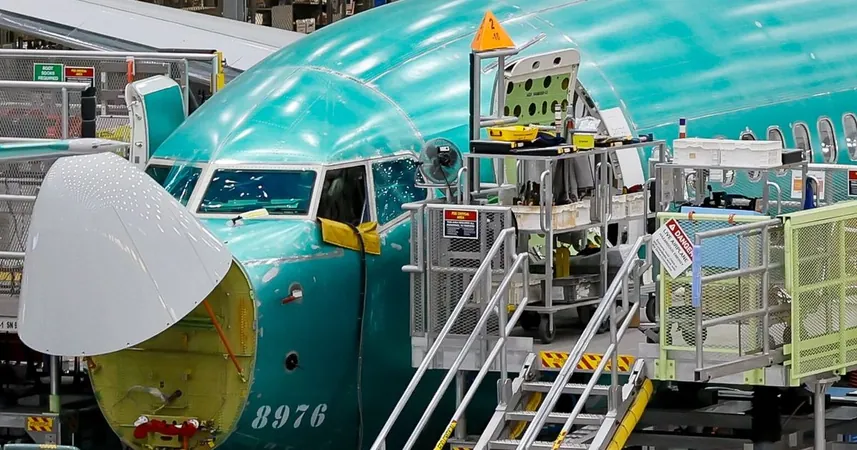
Boeing Faces Uphill Battle as Airbus Dominates Jet Deliveries in 2024
2025-01-15
Author: Jia
Boeing Faces Uphill Battle as Airbus Dominates Jet Deliveries in 2024
In an astonishing display of market dominance, Airbus outperformed Boeing in jet deliveries in 2024, according to year-end figures released by Boeing. The data illustrates the extent of Boeing's challenges as Airbus delivered a staggering 766 commercial jets, compared to Boeing's mere 348 deliveries—a stark contrast that highlights the ongoing crisis faced by the American aerospace giant.
In the competitive narrowbody jet segment, particularly with the A320neo family, Airbus delivered 602 aircraft, including a significant number of the larger A321neo, thereby overshadowing Boeing's 260 deliveries of the 737 MAX. Airbus's lead can be attributed to its strategic focus on the larger A321neo, which Boeing currently lacks a comparable model to match in size and range.
The disparity in deliveries also translated into financial figures, with aircraft valuation firm Avitas estimating the worth of Airbus's deliveries at $52 billion—an eye-watering amount that is double the value of Boeing's deliveries that year. Boeing's production cuts stem from various issues, notably a midair fuselage blowout incident on an Alaska Airlines flight, which severely impacted trust and production rates of the beleaguered 737 MAX. Compounding this, a 52-day strike by the Machinists union halted almost all production at Boeing’s Puget Sound plants, stalling a recovery that had exhibited only modest signs of progress.
Despite these setbacks, the aerospace industry as a whole grapples with the fallout from the COVID-19 pandemic, particularly the loss of skilled workers, which has resulted in persistent supply chain disruptions for manufacturers, including Airbus. While Airbus also contended with supply constraints—particularly regarding engines and certain components from supplier Spirit AeroSystems—it has managed to navigate these challenges more effectively than Boeing, largely due to Boeing's self-inflicted issues.
As Airbus strives to enhance its production capabilities, CEO Christian Scherer announced plans to ramp up A320 family production from 50 to 75 jets per month by 2027, with new assembly lines expected in Mobile, Alabama, and Asia. The urgency behind these moves is underscored by persistent demand for new aircraft, as airlines rush to place orders. In fact, Airbus secured 826 net orders in 2024 against Boeing's 317 net orders, revealing a stark preference shift among airlines.
Adding to its woes, Boeing faced 192 cancellations—many of which originated from Jet Airways of India, which ceased operations last year. In contrast, Airbus experienced a mere 52 cancellations. While airlines hesitated to place new orders with Boeing, citing concerns about ongoing production issues and delays in the certification of new models like the MAX 7, MAX 10, and 777X, they showed greater confidence in Airbus's offerings.
In the widebody jet sector, where Boeing historically held an advantage, Airbus flipped the script with 89 deliveries compared to Boeing's 88, driven primarily by the success of its A350 jet. Airbus aims to increase A350 deliveries to 12 jets per month by 2028, countering Boeing’s delays on the 777X program, which is not expected to enter service until late 2026.
Even in the cargo plane market, once a Boeing stronghold, the tide appears to be turning, with Airbus beginning to make inroads, thanks to its expanding A350F cargo aircraft orders. Starlux Airlines of Taiwan has recently increased its A350F order to a total of 60, showcasing growing interest in Airbus's cargo offerings.
As 2025 unfolds, Boeing faces mounting pressure to not only recover from its recent production issues but also to strategize effectively against an aggressively expanding Airbus. The battle for market supremacy in the aerospace industry is destined to escalate, leaving Boeing at a crossroads that could define its future trajectory in the global market.



 Brasil (PT)
Brasil (PT)
 Canada (EN)
Canada (EN)
 Chile (ES)
Chile (ES)
 Česko (CS)
Česko (CS)
 대한민국 (KO)
대한민국 (KO)
 España (ES)
España (ES)
 France (FR)
France (FR)
 Hong Kong (EN)
Hong Kong (EN)
 Italia (IT)
Italia (IT)
 日本 (JA)
日本 (JA)
 Magyarország (HU)
Magyarország (HU)
 Norge (NO)
Norge (NO)
 Polska (PL)
Polska (PL)
 Schweiz (DE)
Schweiz (DE)
 Singapore (EN)
Singapore (EN)
 Sverige (SV)
Sverige (SV)
 Suomi (FI)
Suomi (FI)
 Türkiye (TR)
Türkiye (TR)